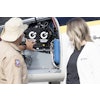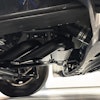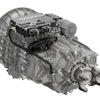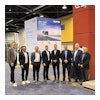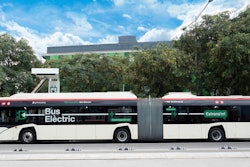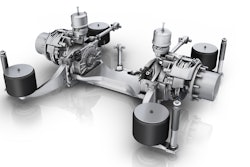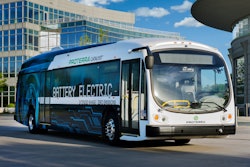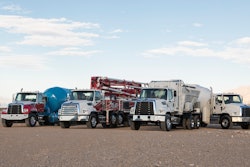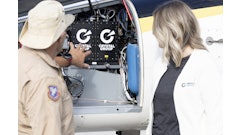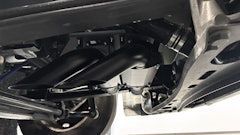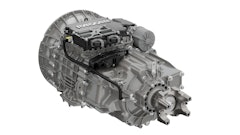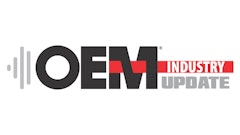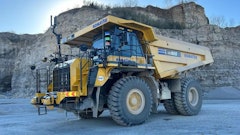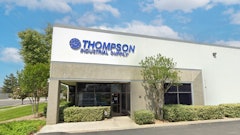NFI Group Inc. (NFI), the largest bus and motor coach manufacturer and parts distributor in North America, announces its deliveries, order activity and backlog update for the 13-week period ended December 30, 2018 (Q4 2018). Year-over-year comparisons reported in this release compare Q4 2018 to the 13-week period ended December 31, 2017 (Q4 2017) and previous quarter comparisons compare Q4 2018 to the 13-week period ended September 30, 2018 (Q3 2018). References to Fiscal 2019 are to the 52-week period of December 31, 2018 to December 29, 2019 and references to Q1 2019 are to the 13-week period ended March 31, 2019.
Deliveries, Order Activity, and Option Expiry
NFI delivered 1,126 equivalent units (EUs) in Q4 2018, an increase of 58 EUs compared to Q4 2017 and an increase of 91 EUs from Q3 2018. For the 52-week period from January 1, 2018 to December 30, 2018 (Fiscal 2018) NFI delivered 4,313 EUs, up 485 EUs from the 52-week period January 1, 2017 to December 31, 2017 (Fiscal 2017). Total inventory at December 30, 2018 decreased 48 EUs from the previous quarter to 523 EUs.
Fiscal 2018 Heavy-Duty Transit deliveries were 29 EUs lower than the previously announced annual delivery guidance primarily as a result of timing related to delivery issues. Management expects the majority of units impacted by the delay will be delivered in Q1 2019. Motor coach annual deliveries were 40 EUs lower than guidance primarily from private motor coach sales activity. Private motor coach sales were negatively impacted by a pre-owned coach auction that was held in Q4 2018 by a customer who ceased operations to liquidate 100 vehicles. ARBOC deliveries were eight EUs lower than guidance as a result of timing delays. Management expects these units will be delivered in 2019.
NFI’s new orders in Q4 2018 totaled 857 EUs, which included firm orders of 784 EUs (valued at $356.9 million) and option orders of 73 EUs (valued at $33.6 million). In addition, 575 option EUs were converted to firm orders (valued at $361.6 million).
Total reported orders do not include 589 EUs of new firm and option orders that were pending at the end of Q4 2018, where approval of the award to NFI had been made by the customer’s board, council, or commission, as applicable, but purchase documentation had not yet been received by NFI and are therefore not yet included in the backlog.
NFI’s Fiscal 2018 Book-to-Bill ratio (defined as new firm and option orders divided by deliveries) was 87%, down from 152% in Fiscal 2017. The Book-to-Bill ratio in the second half of Fiscal 2018 was impacted by a higher number of smaller individual transactions and by delayed bid activity for multi-year contracts. Management believes transit agencies‘ assessment of future battery-electric vehicle adoption as a component of their overall fleet renewal strategies contributed to the delays in releasing multi-year procurements.
The majority of public transit contracts, bid by both New Flyer and MCI, have a term of 5 years and include both firm orders and options.
While NFI’s option conversion rate improved from Q3 2018 to Q4 2018, it was lower in Fiscal 2018 when compared to Fiscal 2017. The decrease was primarily driven by expired 5-year contracts with three customers who no longer required the contracted specific size/propulsion configurations, and who were not permitted to assign the options to other transit agencies due to the amendment to U.S. Federal Transit Administration guidelines which went into effect after the contracts were awarded.
Total Backlog and 2018 Production
At the end of Fiscal 2018, NFI’s total backlog was 10,833 EUs (valued at $5.35 billion) compared to 11,110 EUs (valued at $5.51 billion) at the end of Q3 2018, and 12,157 EUs (valued at $6.02 billion) at the end of Fiscal 2017.
NFI’s total backlog consists of buses sold primarily to public customers. The majority of the backlog relates to New Flyer transit buses for public clients with some of the backlog consisting of units from MCI and ARBOC. Options for ARBOC vehicles are held by dealers, rather than the operator, and are not included as options in the NFI backlog, but are converted to firm backlog when vehicles are ordered by the dealer.
Transit buses and motor coaches incorporating clean propulsion systems, including compressed natural gas (CNG), diesel-electric hybrid, and zero-emission buses and motor coaches (ZEBs, which consist of trolley-electric, fuel cell-electric and battery-electric buses), represent approximately 42% of the total backlog. ZEBs alone represent approximately 5% of total backlog.
Parts Activity
Total shipments by NFI Parts for Q4 2018 decreased by 8.2% compared to the previous quarter, and decreased by 6.9% compared to Q4 2017. The lower shipments in Q4 2018 compared to Q3 2018 was largely due to lower bid activity during the period. The win rate for NFI Parts during Q4 2018 was within historical ranges. ARBOC aftermarket parts orders and shipments are not included in these figures as they are not material.
Market Demand and Outlook
NFI’s Bid Universe metric attempts to forecast active public-sector competitions in Canada and the United States (U.S.) and to provide an overall indicator of active bid activity and anticipated heavy-duty transit bus and motor coach market demand. It is a point-in-time snapshot of: (i) EUs in active competitions, defined as all requests for proposals received and in process of review plus bids submitted and awaiting customer action, and (ii) management’s forecast based on public customer projections of expected EUs to be placed out for competition over the next 5 years.
At the end of Q4 2018, the total Bid Universe was 23,425 EUs, an increase of 2,063 EUs from Q3 2018. The Bid Universe EUs may fluctuate significantly from quarter-to-quarter based on public tender activity procurement and award processes.
The size of active procurements in the second half of Fiscal 2018 was impacted by smaller individual bids and delayed bid activity for multi-year contracts. Management’s ongoing discussions with several public transit customers throughout the U.S. and Canada suggest there may be an increase in the number of requests for proposals and public tenders issued in Fiscal 2019 and 2020 to account for this delayed or decreased activity. This anticipated increase in bid activity has been reflected in the chart above describing the growth in forecasted procurements.
Procurement of heavy-duty transit buses and motor coaches by the public sector is typically accomplished through formal multi-year contracts, while procurement by the private sector is typically made on a transactional basis. As a result, NFI is unable to create a Bid Universe metric for private sector buses or motor coaches.
Cutaway and medium-duty buses manufactured by ARBOC are also typically sold on a transactional basis through third party dealers who hold contracts directly with the operators. Bids are submitted by and contracts are held with non-exclusive dealers and therefore there is no NFI Bid Universe metric for cutaways and medium-duty buses.
Management expects heavy-duty transit bus and motor coach procurement activity by public agencies throughout the U.S. and Canada to be healthy in 2019 based on an aging fleet, economic conditions, defined federal funding and expected customer fleet replacement plans. Management expects Fiscal 2019 will be a more active period for new public customer vehicle procurements. In addition, management expects industry demand for ZEBs to increase slightly in Fiscal 2019 and represent approximately 10-15% of the industry’s active heavy-duty transit procurements. Management believes the Company has a strong offering to meet this increased demand for ZEBs given NFI has over 50 years of experience in manufacturing zero-emission buses and has more electric buses on the road in North America than any other manufacturer. In order to further strengthen its ZEB product offering, the company recently launched New Flyer Infrastructure Solutions a service aimed at providing safe, reliable, smart, and sustainable charging and mobility solutions to public transit customers.
Management continues to anticipate relatively stable private sector demand for motor coaches through 2019. During Fiscal 2019 management anticipates gaining market share in the motor coach market through the sales of new vehicle models, including the D45 Commuter Rapid Transit Low Entry vehicle (D45 CRT LE), which features revolutionary improvements to support individuals with disabilities, and the new J3500, the 35-ft. version of MCI’s best-selling 45-ft. coach, the J4500. During Q4 2018 MCI was awarded a contract for 77 D45 CRT LE motor coaches from a significant employee shuttle customer in the San Francisco Bay area and delivered its first J3500 vehicles.
Management believes the demand for low-floor cutaway and medium-duty buses with greater accessibility will continue to grow from current levels and that ARBOC will be a beneficiary of this increased demand. ARBOC’s medium-duty Spirit of Equess (Equess) product launched in late Q4 2018 and management is focused on quality, production efficiencies and increasing deliveries of the Equess in Fiscal 2019. The Equess has a higher average selling price and higher gross profit per unit than ARBOC’s low-floor cutaway vehicles and is expected to represent 10-15% of ARBOC’s total Fiscal 2019 deliveries.
Based on NFI’s current master production schedule, combined with the current firm backlog, the anticipated option conversion rate and new orders anticipated to be awarded by public customers from procurements, management expects to deliver 4,455 EUs in Fiscal 2019, an increase of 142 EUs, or 3.3%, over Fiscal 2018.
Due to the nature of the aftermarket parts business, parts sales remain difficult to forecast as a result of typical quarter-to-quarter volatility which at times can be material. Management expects that the vendor managed inventory (VMI) programs NFI Parts secured in Fiscal 2018 will have a positive impact on parts sales volumes in Fiscal 2019 and beyond, but at potentially slightly lower margins than historical periods.
NFI’s Q4 2018 earnings are expected to be impacted by several factors including: ongoing startup expenses of NFI’s new Shepherdsville, KY, parts fabrication facility, costs and lost revenue from the termination of MCI’s Distribution Rights Agreement (DRA) for Daimler’s Setra motor coaches and spare parts in North America, lower than anticipated vehicle deliveries, and margin pressure in the private motor coach segment as a result of sales mix, higher trade-in subsidies and fair market value adjustments on pre-owned coaches in MCI’s inventory.
In the company’s Q3 2018 financial results NFI disclosed that start-up costs of $1.6 million related to the Shepherdsville facility and price reductions of $2.2 million on the sale of new and pre-owned Setra coaches had a negative impact on Q3 2018 Adjusted EBITDA. For Fiscal 2019, management expects the Shepherdsville facility start-up expenses to continue to impact Adjusted EBITDA for the first two quarters, before the facility achieves break-even operating status in the second half of the year. Management does not expect the termination of the DRA to have a material impact on Fiscal 2019 results.
Having completed several significant capital expenditure projects in Fiscal 2018, management expects that its property, plant and equipment (PPE) expenditures will decrease in Fiscal 2019 and will be in the range of approximately $50 to $60 million. This is a decrease from the Fiscal 2018 expected range of $63 to $73 million. This estimated expenditure includes investments for several capital projects that were started in Fiscal 2018, including the Shepherdsville facility and IT harmonization projects at MCI, and are expected to be completed in Fiscal 2019.
